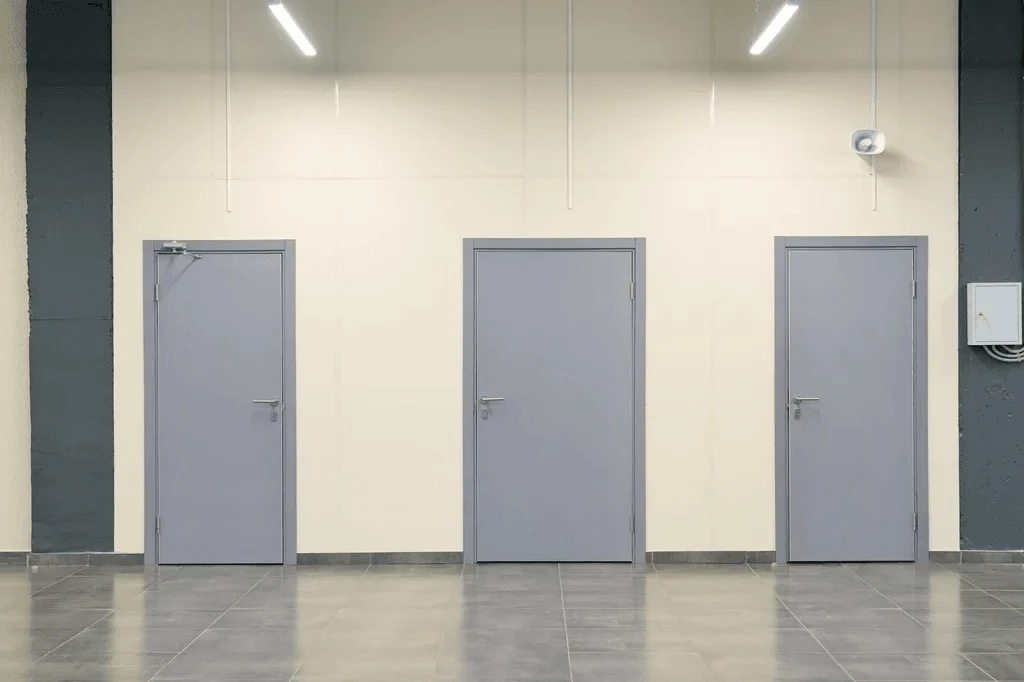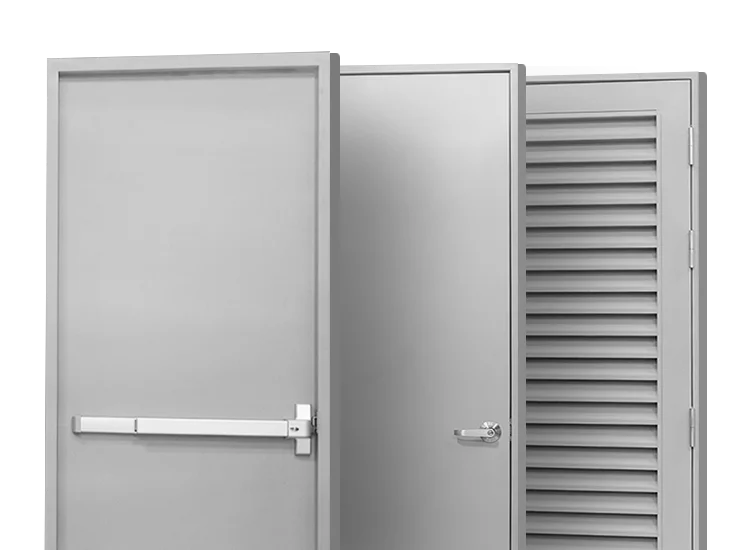A bustling office is the clattering of keyboards, workers passing by and bumping each other, the pandemonium a few hours before a presentation or deadline, the noises of various office equipment, and escalating voices of conversing colleagues. Given these actual circumstances, how can one go on with their job? Soundproofing is the answer. It doesn’t just block out annoying and undesirable noises; it creates a working environment that minimizes stress but maximizes productivity.
In this article, let’s talk about soundproofing, what it is, how it benefits employees’ well-being, and the main areas in the office that need soundproofing. We’ll also discuss some tips for effective office soundproofing, and the role of steel doors in achieving better soundproofing. Let’s dive in.
What is Soundproofing?
Soundproofing refers to the process of reducing or eliminating sound transmission between spaces. It involves various techniques and materials aimed at minimizing noise from external sources or preventing sound from escaping an area.
In addition, soundproofing refers to the use of insulative materials to isolate sound. These materials can range from specialized wall coverings and acoustic matting to straightforward procedures like thicker underlay beneath carpet or weather stripping around doors.
Soundproofing vs. Sound Absorption
Two techniques for reducing noise in places are soundproofing and sound absorption. While sound absorption employs light, porous materials to lessen echo and reverberation, improving the indoor acoustic environment and serving various noise control functions, soundproofing uses solid materials to limit sound transmission.
- Target: Sound absorption seeks to maximize the acoustic quality within a place, whereas soundproofing stops sound from entering or leaving a space.
- Products: Density and bulk are the two main ways that soundproofing materials block sound. Conversely, materials that absorb sound are porous and soft.
- Expense: The size, function, and design of your area will determine how much soundproofing treatments and acoustic panels will cost. However, soundproofing projects tend to be more expensive than sound absorption solutions.
The Benefits of Office Soundproofing for Employee Well-Being
These are the main five benefits of soundproofing an office that raise satisfaction among employees:
Better Productivity and Focus
Soundproofing in an office significantly enhances productivity and concentration by reducing noise disturbances, which can hinder task concentration. This creates a calm atmosphere, boosting output and efficiency.
Stress Management and Improved Employee Wellness
Excessive noise in the workplace can be distracting and stressful, impacting employees’ mental health and wellbeing. A calm work environment, primarily based on soundproofing, is essential for employee happiness and satisfaction. Studies show that quieter environments reduce stress and anxiety, promoting a happier and more effective workplace.
Greater Security and Privacy
Soundproofing is crucial for maintaining confidentiality and privacy in workspaces, especially for private meetings and chats. It prevents eavesdropping and information leakage, especially in industries requiring data privacy and client confidentiality. Businesses can demonstrate their commitment to privacy by installing soundproofing measures, which are appreciated by staff and customers.
Optimized Acoustics for Improved Communication
Soundproofing not only reduces noise but also enhances acoustic quality, enhancing verbal communication and effectiveness in office settings like meetings, conference calls, and presentations. Clear acoustics ensures accurate communication and enhances collaboration, making soundproofing an investment in improving the workplace environment.
Aesthetic and Functional Design
Contemporary soundproofing technologies enhance office spaces beyond noise reduction, enhancing their visual appeal and seamless integration. Available in various styles, colors, and materials, these installations complement any interior decor, creating a polished workspace and enhanced sound quality.

Key Areas in Your Office That Require Soundproofing
A variety of office settings will benefit from soundproofing initiatives. Soundproofing is a typical practice that can help the following office areas:
- Conference and Meeting Rooms: Meeting spaces frequently resound with talk and demonstrations. Good soundproofing guarantees privacy and keeps noise levels down, facilitating productive talks.
- Call Centers: Call centers, which have daily talks, need a calm environment. By lowering background noise, soundproofing promotes better customer service and clear communication.
- Public Squares: Common spaces like lounges, cafeterias, and breakout areas are always havens for cacophonous hotspots. Soundproofing these areas allows you to create quiet areas among the bustle of the office.
- Reception or Atriums: Entrances must constantly have a polished appearance and offer a necessary, functional environment at all times, particularly at times when there may be a spike in traffic.
Where to Install Soundproofing Solutions
The following are the main spaces in your office that might benefit from soundproofing measures:
1. Doorways
The acoustical journey of an office starts at its doors. Keep in mind that up to 50% of sound can pass through a 1% hole. Therefore, there’s almost no purpose in soundproofing your doors if they’re not entirely sealed.
2. Electric Fixtures
Most of the time, sound leaks go unnoticed because they are tiny and originate from places like your light fixtures. You must install soundproofing that doesn’t detract from your ceiling’s aesthetic appeal.
3. Air Holes
HVAC systems do more than just keep the temperature stable; they also transmit a lot of outside noise, which may seriously affect the quality of the sound in your home.
4. Walls and Ceilings
Acoustic panels are generally better off mounted on the walls and ceiling than on the ground. This is because soundwaves pass through solid objects like ceilings and walls more readily. Panels placed on these surfaces will aid in lessening resonance and echo in the space.
Practical Tips for Effective Office Soundproofing
Businesses can improve room acoustics by identifying echo and noise sources and implementing the following best practices to enhance meeting productivity and communication with careful preparation and execution.
1. Repurpose office spaces with acoustic enhancement technologies.
Retrofitting spaces with acoustically sound solutions like ceiling tiles or panels helps reduce background noise, echo, and enhance speech intelligibility. Having said that, it’s crucial to consider the space’s specific needs and consult an acoustic specialist.
2. Block all vents to prevent noise passage.
Effective soundproofing in a boardroom requires attention to detail, particularly in sealing leaks around windows, doors, and other openings. This ensures optimal acoustic performance, making the meeting space more comfortable and productive.
3. Set in acoustic door seals.
Acoustic door seals are crucial for soundproofing boardrooms, reducing noise transmission, and enhancing voice intelligibility during meetings. They are easy to install and caulk spaces surrounding doors, preventing sound from seeping in or out.
4. Make the doors soundproof.
Soundproofing plans rely on doors with airtight seals and solid materials. Hollow-core doors offer minimal sound resistance. Proper seals and professional installation are crucial. Different types of soundproof doors offer varying noise reduction levels.
5. Apply soundproof drywall.
Soundproof drywall is essential for acoustic ideals in conference rooms. Thicker options are recommended for better sound blocking. Sealing gaps and seams between walls, floors, and ceilings can reduce noise levels and create a more effective meeting environment.
6. Utilize mass-loaded vinyl.
Mass-loaded vinyl (MLV) is a sound barrier used in boardrooms to limit noise transmission and improve secrecy and privacy. It blocks sound transmission by adding mass to the gap between noise sources and listeners.

The Role of Steel Doors in Achieving Superior Soundproofing
The soundproofing qualities of steel interior doors vary based on the door’s construction and glass type. But generally speaking, they’re a terrific way to lower noise levels.
In line with this, steel is a great sound-blocker, and steel doors play a crucial role in achieving superior soundproofing due to their construction and material properties. Here are some key elements that prove the efficacy of steel doors in office soundproofing:
- Density and Mass: Steel is significantly denser than many other materials used in door construction, such as wood or hollow-core doors. This increased mass blocks sound waves more effectively, reducing the amount of sound that can pass through.
- Solid Construction: Steel doors are often solid rather than hollow, providing an uninterrupted barrier to sound. This makes them more effective for soundproofing.
- Durability and Longevity: The durability of steel doors means they maintain their soundproofing qualities over time, unlike some materials that may warp or degrade, potentially compromising their effectiveness.
- Fire Resistance: In addition to soundproofing, many steel doors also offer fire resistance, providing an added layer of safety and security.
Completely Upgrade Your Office with a Soundproof Steel Door
Soundproofing goes above the artistic features and suppressing noise. Instead, it also means investing in your employees’ well-being. It provides a comprehensive approach to establishing the perfect work environment by improving focus, communication, and privacy.
When you’re prepared to make your workspace a more comfortable and productive place to be, think about how soundproofing will be a great help. Steel, as a top-tier noise blocker, can be considered worth the expense. For superior steel doors that are specially designed to satisfy the demands of commercial and industrial residential buildings, Janus Steel OPC is the go-to source, with an unwavering dedication to innovation, quality, and client happiness. Inquire now.





